The United Nations‘ chief privacy watchdog on Monday slammed a U.K. bill that would give the British government vast new spying powers.
“The snoopers’ charter in the U.K. is just a bit worse than scary, isn’t it,” Joseph Cannataci, the U.N. special rapporteur on privacy, said at the Internet Governance Forum in Brazil, referring to the Draft Investigatory Powers Bill that the British Parliament is debating.
The bill would require Internet service providers and phone companies to store customers’ Internet browsing activity and call logs for up to a year so that police could access them with a warrant. It would also let British law-enforcement agencies hack into electronic devices, and it would require tech companies to ensure that agencies can access their customers’ encrypted data.
Critics have compared the bill’s new authorities to the National Security Agency’s mass surveillance in the United States. NSA operations—ranging from the bulk collection of Americans’ phone and Internet data to spying on foreign heads of state and bugging the U.N. headquarters in New York—sparked global condemnation when journalists working with former NSA contractor Edward Snowden began revealing them in 2013.
Cannataci, the U.N.’s second privacy rapporteur, inveighed against the bill at the IGF event, saying that it did not take U.K. residents’ privacy concerns seriously.
“If your oversight mechanism’s a joke, and a rather bad joke at its citizens’ expense,” he told the Guardian, “for how long can you laugh it off as a joke?”
Although the bill creates a panel of judges that can veto a U.K. minister’s warrant approval, that panel cannot veto so-called “urgent” surveillance requests for operations lasting as long as five days.
The bill would also formalize the bulk collection of U.K. citizens’ electronic data, giving legal cover to a decade-long program of illegal mass surveillance by the security agency MI5. In August, Cannataci said that existing U.K. surveillance was worse than what George Orwell imagined in his seminal novel 1984.
The United Nations made electronic privacy a priority when it created the rapporteur post in March. David Kaye, the first rapporteur, called encryption a human right in his first major report, slamming governments like the Obama administration for considering ways to add “backdoors” to secure products.
As the U.N.’s chief privacy overseer, Cannataci is responsible for ensuring that national surveillance regimes operate in accordance with U.N. member-states’ international human-rights obligations.
Apple CEO Tim Cook joined the opposition to the Draft Investigatory Powers Bill on Tuesday, criticizing in particular the provision requiring tech companies to build backdoors for law enforcement.
“Any backdoor is a backdoor for everyone,” Cook told the Daily Telegraph. “Everybody wants to crack down on terrorists. Everybody wants to be secure. The question is how. Opening a backdoor can have very dire consequences.”
H/T Wired | Illustration by Jason Reed


